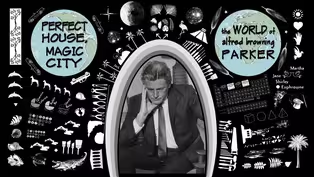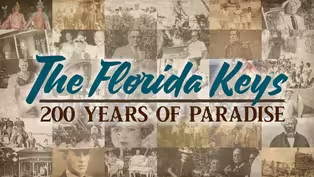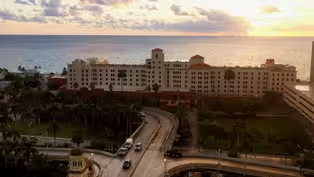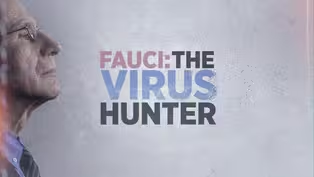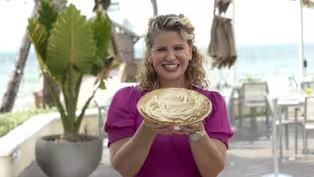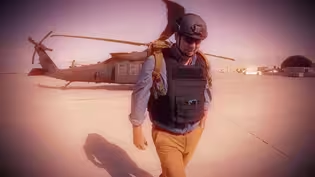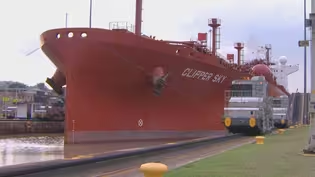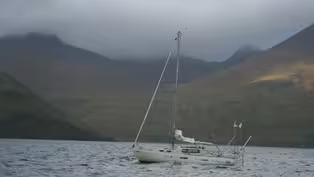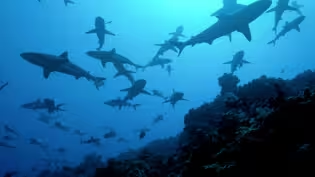South Florida PBS Presents
We're All Plastic People Now
Special | 56m 50sVideo has Closed Captions
Investigation into the hidden story of plastic and its effects on human health.
Introduced by actor and environmentalist Ted Danson, We’re All Plastic People Now investigates the hidden story of plastic and its effects on human health. In an era of throw-away ease, convenience has cost us our well-being. We’re All Plastic People Now asks the question, how much evidence do we need before we decide to take action?
Problems playing video? | Closed Captioning Feedback
Problems playing video? | Closed Captioning Feedback
South Florida PBS Presents is a local public television program presented by WPBT
South Florida PBS Presents
We're All Plastic People Now
Special | 56m 50sVideo has Closed Captions
Introduced by actor and environmentalist Ted Danson, We’re All Plastic People Now investigates the hidden story of plastic and its effects on human health. In an era of throw-away ease, convenience has cost us our well-being. We’re All Plastic People Now asks the question, how much evidence do we need before we decide to take action?
Problems playing video? | Closed Captioning Feedback
How to Watch South Florida PBS Presents
South Florida PBS Presents is available to stream on pbs.org and the free PBS App, available on iPhone, Apple TV, Android TV, Android smartphones, Amazon Fire TV, Amazon Fire Tablet, Roku, Samsung Smart TV, and Vizio.
Providing Support for PBS.org
Learn Moreabout PBS online sponsorshipMore from This Collection
Documentaries showcasing the South Florida community produced by South Florida PBS.
Video has Closed Captions
A documentary portrait of architect Alfred Browning Parker. (56m 46s)
The Florida Keys: 200 Years of Paradise
Video has Closed Captions
Journey through the history of the Keys and meet the people who live there. (56m 46s)
Video has Closed Captions
The Historic Hollywood Beach Resort, also known as the "Grand Lady," has a famous and stor (26m 29s)
Video has Closed Captions
Explore Dr. Anthony Fauci's unique legacy in infectious diseases research. (56m 26s)
Video has Closed Captions
Michelle Bernstein tours the Florida Keys in search of local specialties, recipes and more (56m 46s)
Video has Closed Captions
The story of American men and women serving in our wars in the Middle East. (24m 46s)
Panama Canal: Prized Possession
Video has Closed Captions
Explore the history of the transfer of the Panama Canal from the United States to Panama. (57m 23s)
Video has Closed Captions
Basel, Switzerland plays host to the largest and most influential art fair in the world. (26m 58s)
Video has Closed Captions
Experience the explosion of the Latino influence on mainstream American music and culture. (57m 23s)
Red Dot on the Ocean: The Story of Matt Rutherford
Video has Closed Captions
Matt Rutherford risked it all in an attempt to sail alone around the Americas. (56m 50s)
Video has Closed Captions
Mysteries of the Coral Canyon tells the story of how sharks and coral reefs are connected. (55m 1s)
Video has Closed Captions
Everyone Has A Place is a short musical documentary featuring jazz, gospel and vocals. (26m 55s)
Providing Support for PBS.org
Learn Moreabout PBS online sponsorshippart by Gumbo Limbo Coastal stewards protecting our oceans and our planet through conservation awareness and by Monica and Terry Mayotte for a complete list of funders please visit plasticpeoplemovie.com [Music] has arrived okay we're gonna find out if there is plastic coursing through my veins and quite frankly I find that a very frightening proposition I would if there is plastic coursing through my veins then probably there is plastic in most of us [Music] tell you something about plastic it's in the air it's in the water it's in the food it's in all of all bodies Plastics are everywhere there are a lot of chemicals that are commonly used in plastic packaging even connected to food and beverage that cause cancer that cause reproductive problems plus the constituents can be measur any one of us in our saliva in our urine in our blood and they are even present in babies at birth [Music] a world without plastic yeah can you even imagine that I have a hard time imagining that no change [Music] microplastics are found their way to the home of an unborn baby the problem is the future but people usually are blind to the future we found 29 toxic chemicals in my blood we're seeing rates of colon cancer increase dramatically all those chemicals makes me sick I cannot live here not anymore 99 of plastic is made from fossil fuels oil and gas it's a danger to human health every step of the way throughout its entire life cycle I think at the heart of it the industry was skeptical that recycling co in a significant way sperm count ha declined dramatically over the prior 50 Years it'll be interesting to take a brain of someone with Alzheimer's disease and look and see if you know if there's plastic there too dy ing rapidly this is an experiment in which we did not consent foreign [Music] many many years ago I took my two young daughters to the beach it was one of those beautiful days the ocean was sparkling and we bumped right into a sign that said no swimming water polluted my kids asked me how that was an d I had no answer that moment was my Awakening and ever since I've been devoted to the preservation of our Majestic oc our fragile environment that's why I'm excited to introduce to you this new film regarding one of our planet's greatest threats plastic plastic has been found everyw the deepest part of our oceans to the peaks of the tallest mountains to the food we eat and the air we breathe it's even within our own bodies they're only just beginning to understand its effects upon us world what you're ab to say the least but let's remember change is possible already seeing it I hope you enjoy the film and that it Sparks the kind of real conversation necessary for us to turn the tide on the plastic pollution crisis hi my name is Rolf Halton I'm a professor and the founding director of the biodesign center for environm health engineering we are at a peculiar place and time we have since over 50 years half a century adopted Plastics into our environment into our food and into our bodies there's an analogy to the Roman Empire where we had a whole civilization that overused lead and added lead to drinking water and also used lead as a sweetener people took in a lot of lead it's a neurotoxin so the better you were off the mo the poison you would take in and the powerful people essentially deranged [Music] foreign Hicks I'm from South Florida I'm a nature photographer and I specialize working out in the ocean we rescue these turtles that have been brought back because of our trash and waste it's in their stomach and then we put them back in the same place that we find the trash have you found any plastic yet wow I'm opening up the stoma of plastic I think anyone with the context of that is going to have an emotional feel on the impact of what that could be for those Turtles it's really sad to think that all the animals are like full of plastic and they might be like dying or choking on plastic right now maybe there's like a sea turtle in the water that's choking on plastic as we speak that's especially sad for me because I love animals and I can't watch movies where there's an animal dying or whatever and I just I just hate the thought of animals dying this hard yellow piece of plastic is a type of plastic that we see a lot it's sharp I think this is what led to this sea turtle's death what we can do is is take the plastic out take them out to where their their future Nursery would be and then hope for the best [Music] microplastics have found their way to the home of an unborn baby and this is a first it's never happened before the placenta is crucial to a fetus's development it is supposed to pr oxygen to the baby provide mi croplastics have polluted it [Music] we find 12 pieces of plastic in four of the six placenta I was astonished the most important way in which microplastic go to placenta or go in our body is a soda soda and water drink in plastic bottle the health consequence are not just because we are a cyborg because now we are a little bit biological and a little bit plastic being but also because plastic take with us some chemical compound that are able to change our metabolism I'm Dr David Davis I'm a research assistant professor at the University of Miami Miller School of Medicine Plastics have been shown to be correlated with individuals who are obese and this is this is ongoin [Music] looking at the data is very co for the layperson it might be difficult to translate these types of exposures and concentrations into something meaningful but if we look at the outcome of experiments with animals such as mice if they get ex it at specific times to disrupting chemicals and carcinogens we can see drastic changes in their physiology so you can create fat mice and slim mice it will just by using plastic as the only modifying agent [Music] well I found out a few years ago that between New Orleans and Baton Rouge 85 Mile Stretch was called cancer alley we have I think 150 Industries or plants within that area thank you [Music] so many people are dying of cancer [Music] I lost my sister-in-law with cancer I lost my neighbor on both sides of me with cancer we had so many people dying it made me wonder what was going on in the in the back of my mind I thought maybe the world was coming to an end when I was a little girl we had everything from Food Land we had beautiful trees fruit tr like a dream come true we were never sick and we liv it was wonderful back then [Music] Formosa Plastics decided to come to build in Sain two miles from my home I felt like if another industry would come in here it would be a death sentence for Saint James [Music] I've been paddling here on the Anacostia River just outside of Washington DC where I live for about 12 years now and I love it here it's beautiful I see foxes and beaver and otters and ea gles unfortunately each year there's more and more plastic trash all along the bank here you can see bits of plastic bags hang from the tree branches humans use so many of these plastic bags every year billions and billions is not just the impact on the ocean but on human health pretty heartbreaking [Music] some of the dangerous chemicals in plastic packaging migrate into the food so we're eating it and drinking it that way if we incinerate plastic then these toxic chemicals in the plastic are burned and many of that goes up into the atmosphere we're breathing it it rains down it ends up in our water supply or in our soil so it can get into ou that way foreign [Music] I am oceana's U.S Plastics campaign director we've seen over the last couple of decades the amount of plastic ha s increased rapidly and so too ha of the plastic pollution a lot of opposition that has a lot of money and a lot of resources really focused on their bottom line which is about selling more plastic they're looking towards a world where not only do we have the current amount of plast that's out there but they fact triple the amount of that we've got a lot of responsibility as a country that we need to take action to address the classic crisis and recycling isn't going to be enough so some people are turning to that as a soluti it's not going to be enough to solve Plastics we were told that the Plas be recycled but the truth is that it's much cheaper to make virgin Plastics and sell it to us than to recycle because the recycled materials are typically downcycled we cannot use them for the very same purposes like the Virgin materials and doesn't make sense right now the way we incentivize the use of fossil fuels to make cheap Plastics the things that we carry into recycling centers are only a small fraction of the overall plastic mass that we're using in past years only about nine percent of plastics actually arrived at recyclin centers today it's only five or pe rcent of all the Plastics that we make and consume but that's not where the ba news ends because when the Plastics arrive at the recycling center the recycling center often doesn't have a customer so they just put th on a barge and ship it to a coun doesn't have a solid waste disposal system so it ends up in the land blows into the ocean and comes righ back in our food foreign [Music] how could they go into so many communities and tell when there were so many prob many hurdles I think at the heart of it the industry was skeptical that recycling could work in way and as a result there was a lack of enthusiasm about recycling in the industry responded to some of that skepticism by saying but look how good we are so they mounted millions of dollars of advertising on television particularly in the early 1990s to t to tout the virtues of plastics as if that was going to distract people from criticizing them for their inability to recycle plastic also saves energy presenting the possibilities of plastics we spent a year investigating the oil industry and what we found is that while the oil industry was spending millions of dollars telling the American public to recycle their own internal documents show that they knew that recycling was never going to work on a large scale we found documents that called it costly and feasible we found a document said there was serious doubt that it would ever be made viable on an economic basis [Music] I'm Emily Penn founder of X Expedition based here in London in the UK [Music] X Expedition is a series of all women's sailing voyages and we've been sailing to different parts of the world to understand the plastic and the toxi pollution issue [Music] yeah so we're interested many pieces of microplastic are there on the surface of the ocean and then to be able to do our analysis back in the it's only when you take a fine mesh net across that surface and bring it up that you realize what the true problem is in reality there's actually very little scientific evidence that connects plastic and toxic pollution from the bottom of the food chain to the top and so I decided to skip to the end of the chain to find out if this is something that we even needed to worry about and tested my own body for the chemicals that we were finding in the sea and in the plastic thank you well then yay let's see what the results say working toge we chose 35 chemicals that are banned because they're toxic to humans and of those 35 chemicals we found 29 of them in my blood we tested lots of the women that went out to sea and it was fascinating to see the differences different ages and different parts of the world that we'd all grown up of our crew members who'd grown up eating a lot of fish in the had very high levels of pcbs a chemical that comes from all sorts of industrial processes and ends up accumulating i fish lots of these chemicals that we use in all of our products today to give them the useful properties that they have have their negative consequences our health if they get inside our bodies and particularly for women these chemicals during pregnancy can be really problematic because their endocrine disrupt they mimic those hormones and in a time like pregnancy when hormones are absolutely key for the development of a fetus we don't want anything messing with them my name is Leonardo trasande I'm a pediatrician and direct the NYU center for the investigation of environmental hazards [Music during Medical School became very interested in healthcare policy and decided to get a masters of pu policy with my medical degree we live in a world where we're still not as aware of endocrine disrupting chemicals as we should be you know we're talking about our natural ho molecules that orchestrate all sorts of signaling of basic bodily functions maintaining a healthy temperature good metabolism salt sugar and even sex when we're talking about endocrine disrupting chemicals we're talking chemicals that hack those molecula signals and make things go awry in the human body when he asks endocrine disrupting chemical ma percent or two percent of us know it so ultimately it's that aw areness that we need as a resident in Pediatrics at Boston Children's I literally saw out of the blue this increase in kids with ty diabetes that wouldn't respond to insulin that you had to say yourself well wait a minute what's going on explaining this rise that has en vironment that can't be gene can't change a human genome that q in a single generation let alone two we scientists never have enough data we will always ask for more but you know if you use common sense if you have enough information to know that y 18-wheeler is barreling toward you you step aside and I think we have enough evidence today that this situation is here and we got to act now we will certainly learn about the make and model of the 18 wheeler but we don do that while we're under it [Music] Jess Housley government Affairs director for the wild salmon Center we are on the mighty Columbia River in Stevenson Washington I sort of have always been that outdoorsy kid and have never felt more home than when I'm in the sort of belly of a River Canyon the journey and process of being a an individual that has had to face early onset cancer and colon cancer specifically in that you know sort of grow up hearing of it but you hear of it as sort of the disease that people f in their older age not one that you know anybody in my age range and now unfortunately younger might have to face [Music] my name is Terry Brenham I'm a of medicine my specialty is in gastro began looking at the idea of plastics being a culprit in part because Plastics have been around about 30 to 40 years and that would be about the time frame in which people are starting to get these cancers when I got diag you know my husband and I are having conversation and he's last person in the world I would have thought to get col you're healthy and fit and and we're Outdoors all the time and you you eat really well and you make me eat really well right so it was sort of a shock to our systems we've joined hands with some other researchers Yusuf Ibrahim at the univers Malaysia and some other researchers to take a look at first of all are Cancers and the colons of people that are young that have this disease so these are images that were taken of colon organoid cultures yeah so they're basically three-dimensional cultures of cells that were grown from an adenoma that was taken out of a patient this is my lab manager Dr Lisa Lai so what's our update so the update find Plastics and archival material so one of the concerns that we had was whether or not we could use specimens that had been recovered from surgeries and stored for a period of years and they worked just fine for their experiments we've actually sent them tissue blocks from young people with colon cancer and they have found Plastics microplastic material in those colons of people with colon cancer at a young age I first one-year colonoscopy foll from my ileostomy reversal and you know all in all it went well and it's really good that we went in they found polyps one that was actually eight millimeters which is fairly large for a polyp and especially given that it wasn't on my colonoscopy scan just last year hoping that that a one-year interval for colonoscopies is going to be soon enough uh you know I crac joke the other night wondering why my colon is still trying to kill me just seeing some pretty significant growth patterns of unhealthy reproducting cells in my colon so I'm really concerned about young people like Jessica I see 25 year old people with colon cancer what is happening to our world and I think the answer is that we're becoming the trash that create that it's affecting us so deeply you will rarely see a death certificate that says diet due to plastic exposure but epidemiologists will tell you that if you expose like we do right now millions of people to harmful chemicals there is a rise in the incidence of different diseases we are testing specifically for chemicals in plastic so we're going to determine whether there's plastic in my blood uh and in my daughter's blood and perhaps and my granddaughter's blood and the reason I'm interested in this is to test the different Generations because I would have been exposed the longest but also I was exposed to a much lesser th ere wasn't much plastic when I was a kid and Courtney a little bit a bi t longer you know there was plastic and of course Lucy the short plastic was there right from the beginning so Mom what we're doing is we're going to test your blood you'll be now the fourth generation Plastics were miraculous you could put the baby's diapers in it you could use it for the garbage my first interest in Plastics really had to do with clothes because I started putting a new polyester and that was so much easier than uh ironing everything now of course we know that all those wonderful convenience and it was convenient it still is convenient It's Just Deadly industry it spends a lot of money they are lobbying they make campaign contributions they are runni papers sometimes so they're using their resources and their access and influence to work to get their message out to politicians as well as to to the public too when I first moved here back in the 60s the 70s I started getting sick but every doc that went to they could never tell what was causing my sickness they knew I had a heart problem but my heart practice came out okay so they couldn't tell what was going on until I told them about the chemical that I've been smelling and every time I ch emical I really get sick my children thought I was putting on or whatever I was getting in and out of the hospital my trees are turning black the fruits are not bearing like they're supposed to okay I two of them died my pe orange tree we can't even make Garden here because everything is bad the water is even bad I never drink water the whole while I lived in same game every time I brought the water to get tested they tell me Miss Mill how could you live in that the water she was telling me all the chemicals that they had in the water but nobody did nothing plastic production disproportionately impacts communities of color and low-income communities these are the communities that are around facilities that are creating Plastics and unfortunately these facilities can create a lot of pollution and I believe you me I got to get out of here my things are already packed my dishes over there is in there that come out this tiny cabinet I got boxes suitcases everywhere they don't buy me all I just got to get out if my children want to stay here fine with me I'm gone I'm Shawna Swan I'm a professor in the department of environmental medicine and Public Health [Music] a pregnant woman in fact any woman in fact any person is going to be exposed to a large number of endocrine disrupting chemicals on a daily basis one large class that I've studied a lot are the salads and the phthalates are found in Plastics they're plasticizers they are very prevalent in polyvinyl chloride they're probably one of the major causes for the decline in sperm count sperm over the prior 50 years what I study is particular syndrome called the phthalate syndrome which is how the altered by the mother's exposure to salads salads which are che interfere with the bodies testosterone androgens are primarily entering our body through food what they're doing testosterone initially male and female have the same genital Ridge it doesn't look any different around early first trime starts to be a differentiation there's a signal a genetic signal to and testosterone starts to be produced and that testosterone drives the differentiation of the males and females a happening very fast in early pregnancy and that needs testosterone to be there at the right time and the right amount clearly pregnancy and infancy are uniquely susceptible Windows that's when a lot of basic programming of the human body with those molecular signals being crucial it's like a symphony that needs to be finely orchestrated with certain sounds coming from different components of of the orchestra needing to be at the right time and if they're just off a little bit you can tell right then you see the consequences later on for the rest of the performance and an the performance in this case being the development of a human testosterone doesn't come on board at the right time and there isn't enough of it it doesn't happen as completely as it should then the male will have less descended testicles a smaller penis shorter in a general distance than he would otherwise and there are other changes and incomple sperm production let's just say we call those males incompletely masculinized and in the females if testosterone gets in there sort of when it shouldn't or more than should be there then the female starts producing more male-like genitals so what you're seeing is a decreasing of sex differences so the male becomes less completely a male the female is less completely a female what we see today are decreasing sperm counts and the loss of fertility we are playing with the future of humanity essentially we are allowing chemicals like the plastic chemicals into our family planning they decide whether there is life or not we don't want to give more voting rights to chemicals as we plan our future [Music] so we're looking at toxins in South Florida particularly in Water Systems the toxicology field looks at Dolphins as a sentinel for toxin exposures so we naturally looked at the Dolphin as a model and we wanted to see if some of those toxins are in water actually got into the dolphin's brain water is life so if the water is polluted and we have Sentinel species like dolphins sea turtles if they're also sick we can anticipate that we'll be sick too at the Miami rain endowment Bank we have a well from resource of donated tissue from individuals who've lived to 105 years old so we can look at plastic deposition in their in their brains you know throughout the lifespan our lab became interested in Plastics do some to some recent data shared To Us by a collaborator at the Arizona State University Dr Ralph Holden so we got together and we we put together a pilot experiment so here we have a half a hemisphere of a brain we'll be looking for Plastics in the cranial nerve one which is a nerve that innervates the nasal epithelium and we believe that ambient nanoplastics in the air can be inhaled in through the nose and enter the brain and pote make their way to the hippocampus a region of the brain is responsible for learning their memory really co diseases like Alzheimer's ALS they start with this chronic inflammation so having a particle that hangs around in the nervous system you know for a long amount of time could incite this this process so how much information do we need before we act it's a really good question right now we've shown really good data the field has shown what Plastics can do reproduction obesity cancer but I think adding this final piece of seeing how Plastics relate to our cognition May stimulate a little more urge for things to change like policy and how we produce Plastics how we consume Plastics when I had my children I was very committed to breastfeeding both of them thinking this would give them up in health and life so the times when they were being watched by a nanny or a relative or who would pump breast milk so that they could give a bottle and looking back that using this breast pump I used attachments that were plastic to my breasts that were attached to plastic tubing to the the pump itself that went into a plastic bottle so this is warm breast milk coming through three levels of plastic into a plastic bottle and undoubtedly absorbing some of those chemicals that's absolutely horrifyi to me when you heat up milk in in a plastic bottle some of the the bits of plastic from that bottle are going into the milk that the baby is drinking so it's from the very beginning of our Lives now where plastic is is becoming a pa us foreign breast milk from 34 women in a in a plastic freeway we are able to find microplastic contamination in 26 out of 34 of the samples with a sides ranging from 2 to 12 micronum no one else has exploded plastic in human milk before this study is the first ill all over the world to demonstrate the presence of mycoplastic in human milk [Music] in other situations you'll see companies raise the fact that Plastics are the way we survive as a large-scale society on the human Planet the reality is we did have some Plastics before The Graduate we had Plastics after the graduate and yes they may have made our lifestyle a little faster and more convenient but there was a time we lived without it just that we have binged on them t point that they're choking our Wildlife contamining our water and contaminating us and contributing to our downfall this is not the first time that we put our future at risk we have in the past polluted the air but we came up with Technical Solutions like the catalyti converter and electric cars that from air pollution we were engaged in destroying the ozone layer but we discovered through science the damage we do and within a decade we had regulations in place internationally that protect the ozone layer Plastics is the next big challenge for us you know there everyone's trying to reduce the amount of plastic in their l but you walk into a supermarket or a restaurant and it's really hard you know there aren't very good options you have to kind of really work at it to pl astic right now the way it is the onus is on the consumer to look for these things these problematic chemicals and to protect themselves from them and it shouldn't be that way we shouldn't have to go to the store with this checklist of things to look for av oid nobody has time for that all I say is all we want to do is live a happy normal life and a healthy life that's all we're asking for the company that are producing the majority of plastic that we have in our body are Coca-Cola Pepsi Cola and Nestle we have to change this but in order to change these we need politician that will be able to change [Music] and unfortunately they're not doing it on their own and that's why the government policies are so impo that's why we need National go why we need state and local government to make these make changes so th ey're actually requiring companies to change the way that single-use Plastics are produced and used the only politician that speak about this is a Pope Francisco Francesco wrote that we are always in the same place the Earth and the Earth is the same for everybody and Francesco told to us that we can save everybody or nobody [Music] foreign is a group of nearly 5 000 chemicals used in at least a couple hundred different ways everything from pa ckaging to our clothing and these chemicals don't really break down in nature and they can la human body for years and years that's why they're known as the forever chemicals pfos chemicals can give us cancer including uterine cancer and they c damage our immune systems pfas can also interfere with fetal development and they can harm our hormonal and reproductive systems [Music] one of the issues with dangerous chemicals like pfas or bisphenols there's enough pressure enough consumer concern maybe one or two of these chemicals will be regulated or even banned but we need to regulate them a class what hap replace that chemical with one that's almost exactly like it what we need to do to move away from the unnecessary single-use plastic is move towards refillable and reusable systems and as we have more products that are fillable and reusable it will help create a whole new part of the economy I mean the reality is in the United States endocrine disrupting ch cost our economy 340 billion dollar year so when someone complains that they're losing their market share or they're going to undermine economic productivity I find that heart pl astic can be the future for our big oil company but not to throw us not for Humanity for Humanity plastic is the hand of the future [Music] the reality is that we have this large suite of chemicals being used that are contributing to a variety of chronic disease consequences and we know t when we raise concerns about these chemicals there are people who wi endeavor to to undermine the science [Applause] some of my neighbors with cancer but the people is the that drives me and make me hopeful and make me want to fight for this community for the whole Saint James Parish more chemicals means more cancer more damage nervous nervous system more unexplained illnesses more birth defects more asthma and sick children and more deaths so I come here today because I have n choice they don't care if they come here you see people living here and they still want to build and I don't fault them 100 I fought o politicians for making this area future Industrial when this was residential commercial residential and I want to go see Geraldine Geraldine was our church was our rise Saint James member Cara Dean works so hard Geraldine didn't want to live in Birdland anymore because of the pollution because she couldn and Geraldine was always getting sick always going to the doctor she fought a good fight and God took our own home Cara Dean we miss you so much telling us to keep the fight on [Music] don't let any more people die from all this pollution all these tank forms all around the church it's just so much so much there have been studies showing that there's quite a lot of plastic in drinking water bottled water plastic is in sea salt there's so much plastic in the ocean that if you dehydrate the ocean to make salt you're going to have plastic in that it's starting to be taken up in the root systems of plants so now we know that if you take a bite out of an apple you know one of the healthiest things you can yo u're probably eating a couple th ousand bits of microplastic in that bite of the Apple [Music] there's a hail storm of plastics coming at us at all times and Wastewater happens to be a great medium to study in order to understand the types and quantity of exposures that we incur [Music] when we analyze Wastewater from a municipality in our laboratory it gives us information about all the threads and all the exposures that are occurring in that Community what we see particularly in residential communities is the presence of plastic particulates and plastic constituents so people get exposed on a daily basis and we can that almost in real time in Wastewat the chemicals we detect and that we are concerned about are endocrine disruptors and it's the same type of ch we have demonstrated to Leach out of water bottles the bad news keeps mounting the U.S government lab recently demonstrated that not just millions of billions b actually trillions of nanoparticles of plastics are being released from drinking containers like a single-u cup we don't need if we have things like food and we contact them for long times with plastics and we increase that increases the transfer of ba d chemicals from the plastic into the food whether it's a bottled water or whether it's you know your microwave food right and whatever it is if you a heat it just increases the migration of chemicals from the Plastics into the food hello hey Gordon I just received a call on that the blood tests are finally in what do we got well not a word uh they didn't even give me a hint apparently Rolf wants to meet with all of Su nday at 2 p.m and uh hey I was calling to see if you and Lucy can make it well I'll have to check Lucy's social calendar but I think we could I could be there I mean it's be since we started this some results we're at a Crossroads plastic is probably one of our biggest enemies one of our greatest achievements but probably our biggest enemy it will be here when we're gone we already have done harm to the environment and to All Souls in Ge nerations but it's it's not too late to do something and that is to replace these Plastics with better materi they should be safe and benign by Design and they should have an end-of-life strategy so that when we dispos and when we use them like water bottles that are known to get into the environment that they can and don't accumulate I have hope t can continue to reproduce which is my greatest concern right now there are some very smart people that are starting to make alternatives to endocrine disrupting chemicals starting to find ways to clean en vironment that has been poisoned by these edcs when I was a little girl we didn't have plastic we had bottles glass bottles when when my dad would Milk The Cow and put the milk in a glass bottle you didn't have a plastic container to put our milk in or store our Foods in and we weren't sick we didn't have cancer we didn't ha high blood pressure we didn't have diabetes we didn't have asthma and now since the world have changed so much to so much plastic my message is let's go back to the old we can do is that we can stop stick and producing it and we can maybe find different material that would fill in for plastic but it wouldn't be bad for our Earth 30 years 30 40 years the world would probably look like a giant mess the world would be made out of plastic and everyone would they didn't fix it 30 or 40 years ago the good thing about the plastic problem is that it has a very simple solution all we have to do is stop producing so much of it I do think the science is going to be the source f our hope I think there are ways potentially to rid ourselves of these products certainly not continue to contribute to this pollution I'm a scientist so in my heart I believe that science likely has the answer this is an experiment in which we did not consent in which we are unwitting participants and we're suffering adverse consequences [Music] so rock we all have donated some blood could you let us know what what you found all right well i position I'm in because I I have to share some you know uh not so positi news about our relationship with the chemistry we produce and the chemistry that ends up in our body so far in time we had we have analyzed and found over 80 different chemicals eight zero in the blood that was submitted to us I mean it's deeply upsetting I just it's really upsetting to get your final diagnosis that we are all carrying a load of Plastic Products in our blood I would make it analogous to thinking that you might have cancer and then finding out oh yeah that's right you do I passed by the plant the other day my throat was burning me holding here and other people to o I'm not surprised no because I live in the middle of cancer alley and at the end of the day we are a part of our env can you tell us anything about the exposure levels of plastic and these chemicals uh in the different Generations yeah this is a is a very novel approach of assessing exposure because we're looking at four different Generations within the same family but we detected in the blood of all these participants are precursors of plastics plastic constituents themselves as well as degradation products of consumer Plastics these chemicals are known to be carcinogens endocrine disrupting chemicals obesogens and neurodegenerative agents and our largest concerns right now are with the youngest study participant Lucy because she was exposed in the womb and then also as she developed and she is most likely to get hit by these chemicals at times where she's particularly vulnerable which c of how her body and she herself will develop it's frightened to hear what what has happened and what could happen if we don't pay attention when we contaminated the Earth in the 1950s with the atmospheric testing of nuclear devices we killed about 400 000 people we do not know how many people we are killing today by polluting the planet and ourselves with plastics [Music] foreign [Music] it is safe to be yourself every moment has a meaning capture it cause time is fleeting open up and start receiving let the magic be ANS celebrate each day we're giving love the life that we are living give it all and keep on giving now before the journey and thank God the day is Drawing Near all that we've ever hoped and dreamed the changes happening the movements growing strong and they're truly is a place where you belong [Music] it's all right to love yourself [Music] [Music] [Music] keep on giving [Music] your cup is running over but you cry about the sphere really you know every water bottle it's a time bomb and it while it itself might be safe it's a giant Trojan Horse it looks good at the outside and then it is filled with bad things that eventually you know might do us end I think it's sad that we have to suffer and die because of their greed and that they want to profit off of us and we get done the sicknesses and they give the profits it's not what we do know about Plastics that's a concern it's what we don't know about plastics it's chemical structures its effects on our health our environment potentially our Offspring this is really frightening in time we will gain answers and Rory and all thank you guys for making a movie out of this it's obviously needed in time [Music] funding for this program was provided in part by Gumbo Limbo Coastal stewards protecting our oceans and our planet through conservation awareness and by Monica and Terry Mayotte for a complete list of funders please visit plasticpeoplemovie.com
Support for PBS provided by:
South Florida PBS Presents is a local public television program presented by WPBT
